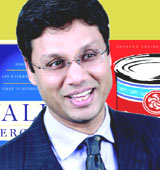|
Executive Interviews: Interview with Nirmalya Kumar on Private Labels
April 2008
-
By Dr. Nagendra V Chowdary
 Nirmalya Kumar
Nirmalya Kumar Professor of marketing, Faculty Director for Executive Education, Director of Centre for Marketing, Co-Director of Aditya Birla India Centre at London Business School. 
Tell us about the origin of this
project (book on Private Label
strategy), what really interested
you?
The way this project started is that, I
work for companies, who comes to
me with a problem and then I try to
solve the problem. Before I solve the
problem, I first try and read the
existing literature, if I don't find
answers in the existing literature
then I start digging in my own
answer based on having read the
existing literature and problemof the
company. Several companies came
to me with the problem of how to
compete against the private labels.So, as I started working more and
more and I started reading on the
literature, I found there
|
|
wasn't really
much on how to compete against
private labels and no books existed
on this subject. So after having done
this for 5 to 7 years, I decided towrite
a book on this subject. One of my
friends also faced the same problem,
with other companies, so we put in
our thoughts for 15 years, and came
with my first book on private labels.
We saw the market there, which is
something related to our expertise,
we developed material and that is
how this project started.
-
In the initial pages of this book
you get to see that it is (private label)
more of a phenomenon that is taking
place throughout theUS. Is that true?
That is true. Private label is not about
developed or developing world.
Private label share is based on the
retail consolidation in the country. If
a country has high retail
consolidation then you have a high
private label share. If a country has a
low retail consolidation then you
have low private label share. -
Is it also correlated with the
economic conditions of a country?
No. America is a one of the
sophisticated markets in the world,
but then private label share is much
lower than the other European
countries because the retail
consolidation is much higher. -
If you go back and trace the
history, what point of time you think
you would have seen the maximum
growth of private labels?
In every country the fastest growth
rate happened wherever faster retail
consolidation has taken place. -
When you look at this growth of
private label brands vis-Ă -vis the
manufacturing brands, in which
category do you find most of them?
More functional the category is, like
toilet paper, paper towels, paper
glasses, etc., in those categories you
find great penetration of the Private
Labels. The more difficult categories for private labels to penetrate are the
ones which add more symbolic and
emotional component to the
consumption, health and beauty
products for example. Beauty
products are a very good example
where private labels have not
contacted success. The initial private label offer had
always been, we are the same quality
but cheaper. Now where the quality
had been pretty much objective,
where the quality is one the customer
is not that interested in a quality
beyond a certain minimum, private
labels took the shelf. -
Is it right to assume that
industries that are likely to get
commoditized have private labels?
The companies that are competing on
the functional characteristics is where
you find more private labels. But
having said that, private label share is
growing fastest in those categories
where the share is the lowest. So,
beauty products for example is one of
the fastest growing private labels
because retailers have become more
sophisticated. Now, they have realized
that putting their own brand name on
beauty products doesn'twork, because
people expect some symbolic
consumption. So they create for
example in shampoo, a line called
Herbal Essences, it is a private label
owned by a company. The retailers
become more sophisticated and know
how to tackle the symbolic
consumption. They don't use their
own brand names but they use vague
brand names. -
We get to see private labels in
products in the last 30-40 years or
so. Do you foresee these kinds of
things happening in service as well?
In services when you say private
label, it has to be seen in a different
way. For example, all credit cards
issued by most people are private
label credit card issued by a bank,
with the name of the retailer in front,
that's a private label. Expedia is
running websites of many airline
companies, that's a private label.
1.
Private Labels Case Study
2. ICMR
Case Collection
3.
Case Study Volumes
|
